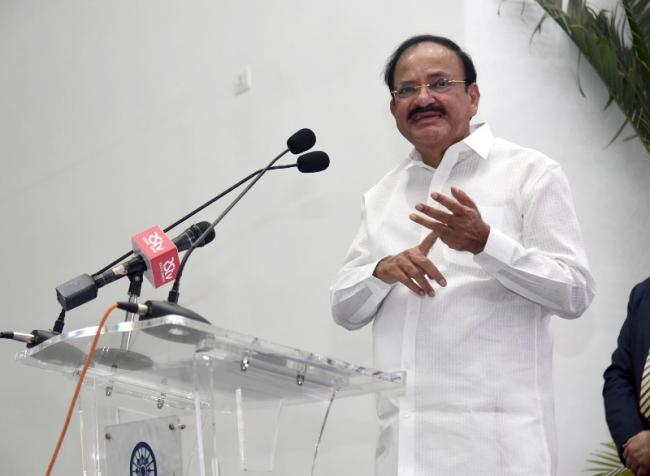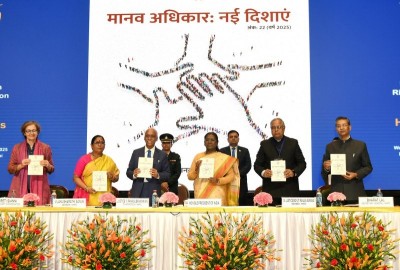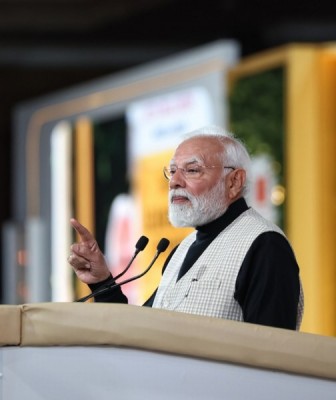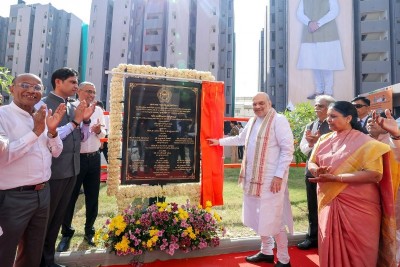
Pedestrian non-motorized zones are the need of the hour: Vice President Naidu
New Delhi, Sept 26 (IBNS): Vice President of Indian M. Venkaiah Naidu has said that the creation of pedestrian non-motorized zones is the need of the hour curb traffic congestions. He was addressing the inaugural session of the Smart City Expo India 2018, in Jaipur, Rajasthan on Wednesday.
The Minister of State for Housing and Urban Affairs (I/C), Hardeep Singh Puri, the Minister for Urban Development, Rajasthan,Shrichand Kriplani, the Minister for Minority Affairs, Rajasthan, Arun Chaturvedi, the Governor of South Australia, Mr. Hieu Van Le AC and other dignitaries were present on the occasion.
The Vice President asked city planners to accord highest priority to the livelihood, security, health, education and skilling of the poor, migrants, and women and said that vulnerabilities of the marginalized sections of the society must be kept in mind.
"Social development should be at the core of every project undertaken by Smart Cities," he added.
The Vice President that you should address the concerns of air, water, soil and sound pollution in cities, apart from the need to promote energy efficiency, recycling urban waste, sustainable soil and land use.
He also stressed on the need to develop neighboring villages as Smart villages by ensuring quality education, health, income opportunities in non-agriculture and allied industries to counter or limit the uneven influx of population into cities.
The Vice President said that India cannot afford lopsided development by allowing the villages to lag behind.
He further said that top priority has to be given to provide road, electric and digital connectivity to villages. Digital technology can link villages with wider market for their produce and roads can ensure logistical linkage, he added.
Vice President said that traffic congestions and vehicular pollution have become the order of day in our cities and highlighted the need to look critically at the issue of city mobility and urban planning.
He further said that our cities have become energy guzzlers with people preferring fuel-inefficient private vehicles over mass public transport.
"We cannot allow this trend to continue and concerted action is needed to promote public transport in a big way," he added.
The Vice President said that Governance at door step is the key objective of smart cities and he asked authorities to work towards digitization of city governance, services, certifications and approvals without unnecessary personal interface.
The Vice President said that no line but online should be the mantra to cut down red tape and provide citizen-centric services.
"This singular step will save the time and effort of citizens and enhance the overall efficiency of the city," he said.
Following is the text of Vice President’s address:
“I am pleased to join you at this important conference that brings global smart city experts, technological solution providers, town planners and administrators to discuss various aspects of techno-administrative interventions to make our cities smart.
Ever since we embarked upon the economic reform process, India has witnessed rapid urbanization. Today 30 per cent of the population lives in towns and cities. Initially, the urban centres developed around the seat of administrative authority and power to cater to the needs of administration.
However, during the last three decades, with the expansion of economic opportunities, the cities and towns have become hubs of booming business and construction activities drawing waves of migrant populations from the hinterland. This constant influx of migrant population has put pressure on the existing civic infrastructure and urban facilities. Irregular settlements have come up at unauthorized localities without basic amenities. This boom in urbanization not only poses a challenge but also provides us an opportunity to make our cities smart with techno-administrative interventions and turn them into livable, inclusive investment destinations where a continuous cycle of investment, employment and prosperity could flourish.
With this objective, the Government of India had launched the Smart City Mission in June 2015 when I was the Urban Development Minister.
The Mission has three components - Retrofitting, Renewal and Redevlopment. I am sure all of you are aware of the details and I do not wish to dwell upon them. The Government also launched complementary schemes like AMRUT, HRIDAY, Clean India and Pradhan Mantri Awas Yojana (Housing for All) with a target to provide a house to every family by 2022.
I am aware that lot of progress has been made in each of the programmes, but a lot more needs to be done rather expeditiously. With all these schemes converging under the umbrella Smart City Programme, I am told that a comprehensive Livability Index for our cities is in the process of being prepared.
These indices have four components - economic development, environmental development, social development and physical development. Each component is measured against 15 parameters. I do believe that the cities covered under Smart city programme will rank impressively on the Livability Index and become lighthouses for other cities.
Following selection of 100 Cities from different States on the basis of competitive bidding, every city is being provided Rs 100 crores every year by the Government of India for five years, while the States are coming up with matching contribution.
I do understand that renewal and redevelopment of a thriving city with floating population is a Herculean task and requires perseverance, political will, administrative skill, technical expertise and massive investment. Removing bottlenecks need persistent effort. It is an ambitious, capital-intensive and technology-driven programme. The selected 100 cities will require an investment of more than Rs 2 lakh crores.
I am happy to note that after obvious initial planning, the programme is in its acceleration phase. Projects amounting to Rs. 6,500 crores have been completed. Other projects with an aggregate value of Rs 16,000 crores have been initiated and are in various stages of implementation.
Friends,
The trend of making our cities smart, economically viable and environmentally sustainable with technological interventions is catching fast world over. This Conference will give you the opportunity to share your experiences, find solutions and help build synergies to remove bottlenecks.
Your choice of the venue is very appropriate. The Pink city, as Jaipur is known for the color of its buildings, has been a Smart city of its time. It was established by a visionary ruler with inquisitive scientific temper, Maharaj Man Singh in 18th century, based on the principles of ancient Vastu Shastra, the science of architecture and town planning. Its buildings, road networks and water storage and sanitation still remain a subject of study.
As we gather here to discuss the smart solutions to our city life, I take this opportunity to compliment the Government and people of the State for their revolutionary work in water storage, preservation of water bodies and rainwater harvesting in this largely arid and semi-arid State. With their efforts, I am told that the ground water table has risen by 5-8 feet in last 4-5 years.
Sisters and brothers,
I am happy to learn that the agenda for conference is comprehensive and you will focus on Innovation, Technology and digital governance to bring transformational change in our city life and make cities truly autonomous.
We should work towards digitization of city governance. Information relating to various services, certifications and approvals should be available digitally without unnecessary personal interface. No line but online should be the mantra to cut down red tape and provide citizen-centric services. This singular step will save the time and effort of citizens and enhance the overall efficiency of the city.
Urban planners should increasingly promote Smart IT-based communication and information services to resolve issues like maintenance of records and enable easy retrieval, real-time monitoring and analysis of data. Encouraging e-governance programmes will provide employment to educated professionals and also facilitate public–private partnership in the affairs of their city.
I would like the experts gathered here to look critically at the issue of city mobility and urban planning. Traffic congestions and vehicular pollution have become the order of day in our cities and need urgent solutions. Our cities have become energy guzzlers with people preferring fuel-inefficient private vehicles over mass public transport. We cannot allow this trend to continue and concerted action is needed to promote public transport in a big way.
I am glad to know that under Smart city scheme, pedestrian non-motorised mobility is being promoted in Jaipur. Also a target has been set to achieve 45 per cent mobility through mass public transport by 2025. I believe that Jaipur will be benefitted by the global experiences in this regard.
As the demand for energy increases with rising urbanization, we need to explore eco-friendly and renewable sources of energy. Our cities generate enormous amount of waste. Piles of garbage, littered plastic bags are common site and choke the water bodies. Clean Technology and Circular economy are the other important issues you will be discussing. You should address the concerns of air, water, soil and sound pollution in cities, apart from the need to promote energy efficiency, recycling urban waste, sustainable soil and land use.
I would advise you to also study the programmes of Union and State governments in this regard and suggest their convergence. I am told that door-to-door collection of waste and garbage is being promoted in this city with a target of 100 per cent coverage.
Sanitation is being given adequate priority with a target of providing 100 per cent access to clean and water-efficient toilets. Rag pickers are important stakeholders in the management of urban waste. They are being registered. The bio-degradable waste is being used in energy processing plants. I am told that to promote efficient use of water, it is proposed to ensure 100 per cent coverage of smart water meters. I am glad to know that the green cover in the city will be expanded and the façade of the heritage buildings of the Jaipur will be improved under the Smart City programme.
Every city has its distinct ethos which is weaved around its history, cultural and literary traditions, customs, beliefs of its citizens, their crafts and skills.
As we seek to make our cities smart with technology interventions, it will also impinge upon the social development of the city. Migration is inevitable and new groups will settle in the city. They will also claim ownership to city’s resources. Since a city is essentially made up of its citizens, social development should be at the core of every project undertaken by Smart Cities. While catering to the needs of the aspirational generation, the smart city planners should consciously address vulnerabilities among marginalized classes. We must focus on the vulnerabilities that marginalize the poor, migrants, and women accord highest priority to their livelihood, security, health, education and skilling.
In Smart cities, technology should not only act as leveler, but must be used extensively to monitor and track societal crimes against women and other vulnerable sections.
Associated with the issue of social development is the question of developing neighboring villages as Smart villages by ensuring quality education, health, income opportunities in non-agriculture and allied industries. This can contain the regular migration to cities. India cannot afford lopsided development by allowing the villages to lag behind. Top priority has to be given to provide road, electric and digital connectivity to villages. Digital technology can link villages with wider market for their produce and roads can ensure logistical linkage.
Heritage city like Jaipur can be immensely benefitted by technological intervention. The old heritage buildings and tourist places have to be developed in a way without changing the character of the building. Smart signage, simultaneous multi-lingual interpretation services, tourist friendly affordable mobility and accommodation, virtual presentation of places of tourist attraction and tourist help services are only a few measures that could turn the whole experience of Jaipur into a memorable one. During my recent visit to historical cities of Eastern Europe, I found the concept of Heritage Walks to be very popular. To facilitate such walks in Jaipur, the city will have to be tourist friendly with smart facilities.
I expect that your discussions will give some practicable solutions. I wish this Conference every success and thank the organizers for inviting me to share my views.
Jai Hind!”
Support Our Journalism
We cannot do without you.. your contribution supports unbiased journalism
IBNS is not driven by any ism- not wokeism, not racism, not skewed secularism, not hyper right-wing or left liberal ideals, nor by any hardline religious beliefs or hyper nationalism. We want to serve you good old objective news, as they are. We do not judge or preach. We let people decide for themselves. We only try to present factual and well-sourced news.







